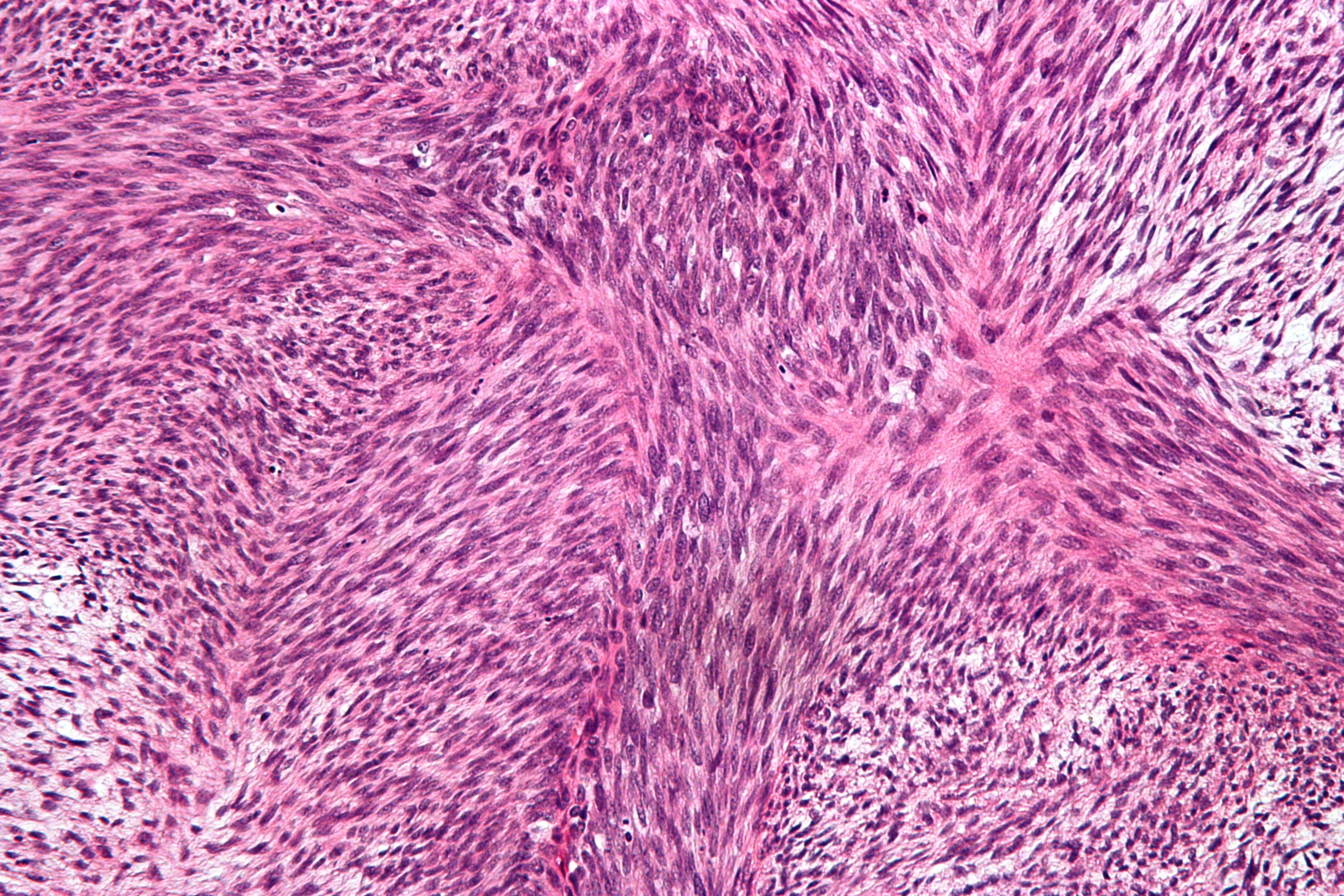Malignant peripheral nerve sheath tumor
(Redirected from Neurosarcoma)
Editor-In-Chief: Prab R Tumpati, MD
Obesity, Sleep & Internal medicine
Founder, WikiMD Wellnesspedia &
W8MD medical weight loss NYC and sleep center NYC
| Malignant peripheral nerve sheath tumor | |
|---|---|

| |
| Synonyms | MPNST, neurofibrosarcoma, malignant schwannoma |
| Pronounce | N/A |
| Specialty | N/A |
| Symptoms | Pain, neurological deficits, palpable mass |
| Complications | Metastasis, local recurrence |
| Onset | Typically in adulthood |
| Duration | Variable |
| Types | N/A |
| Causes | Often associated with neurofibromatosis type I |
| Risks | Neurofibromatosis, prior radiation therapy |
| Diagnosis | Biopsy, imaging studies |
| Differential diagnosis | Schwannoma, neurofibroma, fibrosarcoma |
| Prevention | N/A |
| Treatment | Surgery, radiation therapy, chemotherapy |
| Medication | N/A |
| Prognosis | Generally poor, depends on stage and resectability |
| Frequency | Rare, <0.1% of all cancers |
| Deaths | N/A |
Malignant peripheral nerve sheath tumor (MPNST) is a rare form of cancer that originates from the peripheral nerve sheath, the protective layer that surrounds nerves. These tumors are often aggressive and can spread to other parts of the body.
Symptoms[edit | edit source]
The symptoms of MPNST can vary depending on the location of the tumor. Common symptoms include a growing lump or mass, pain or discomfort, and neurological problems such as numbness or weakness.
Causes[edit | edit source]
The exact cause of MPNST is unknown, but it is often associated with certain genetic conditions such as Neurofibromatosis type 1 (NF1) and Schwannomatosis.
Diagnosis[edit | edit source]
Diagnosis of MPNST typically involves a combination of physical examination, imaging tests such as MRI or CT scan, and biopsy.
Treatment[edit | edit source]
Treatment for MPNST often involves surgery to remove the tumor, followed by radiation therapy or chemotherapy to kill any remaining cancer cells.
Prognosis[edit | edit source]
The prognosis for MPNST varies depending on factors such as the size and location of the tumor, the patient's overall health, and the success of treatment.
See also[edit | edit source]
References[edit | edit source]
Transform your life with W8MD's budget GLP1 injections from $125
W8MD offers a medical weight loss program NYC and a clinic to lose weight in Philadelphia. Our W8MD's physician supervised medical weight loss centers in NYC provides expert medical guidance, and offers telemedicine options for convenience.
Why choose W8MD?
- Comprehensive care with FDA-approved weight loss medications including:
- loss injections in NYC both generic and brand names:
- weight loss medications including Phentermine, Qsymia, Diethylpropion etc.
- Accept most insurances for visits or discounted self pay cost.
- Generic weight loss injections starting from just $125.00 for the starting dose
- In person weight loss NYC and telemedicine medical weight loss options in New York city available
- Budget GLP1 weight loss injections in NYC starting from $125.00 biweekly with insurance!
Book Your Appointment
Start your NYC weight loss journey today at our NYC medical weight loss, and Philadelphia medical weight loss Call (718)946-5500 for NY and 215 676 2334 for PA
Search WikiMD
Ad.Tired of being Overweight? Try W8MD's NYC physician weight loss.
Semaglutide (Ozempic / Wegovy and Tirzepatide (Mounjaro / Zepbound) available. Call 718 946 5500.
Advertise on WikiMD
|
WikiMD's Wellness Encyclopedia |
| Let Food Be Thy Medicine Medicine Thy Food - Hippocrates |
Translate this page: - East Asian
中文,
日本,
한국어,
South Asian
हिन्दी,
தமிழ்,
తెలుగు,
Urdu,
ಕನ್ನಡ,
Southeast Asian
Indonesian,
Vietnamese,
Thai,
မြန်မာဘာသာ,
বাংলা
European
español,
Deutsch,
français,
Greek,
português do Brasil,
polski,
română,
русский,
Nederlands,
norsk,
svenska,
suomi,
Italian
Middle Eastern & African
عربى,
Turkish,
Persian,
Hebrew,
Afrikaans,
isiZulu,
Kiswahili,
Other
Bulgarian,
Hungarian,
Czech,
Swedish,
മലയാളം,
मराठी,
ਪੰਜਾਬੀ,
ગુજરાતી,
Portuguese,
Ukrainian
Medical Disclaimer: WikiMD is not a substitute for professional medical advice. The information on WikiMD is provided as an information resource only, may be incorrect, outdated or misleading, and is not to be used or relied on for any diagnostic or treatment purposes. Please consult your health care provider before making any healthcare decisions or for guidance about a specific medical condition. WikiMD expressly disclaims responsibility, and shall have no liability, for any damages, loss, injury, or liability whatsoever suffered as a result of your reliance on the information contained in this site. By visiting this site you agree to the foregoing terms and conditions, which may from time to time be changed or supplemented by WikiMD. If you do not agree to the foregoing terms and conditions, you should not enter or use this site. See full disclaimer.
Credits:Most images are courtesy of Wikimedia commons, and templates, categories Wikipedia, licensed under CC BY SA or similar.
Contributors: Prab R. Tumpati, MD






